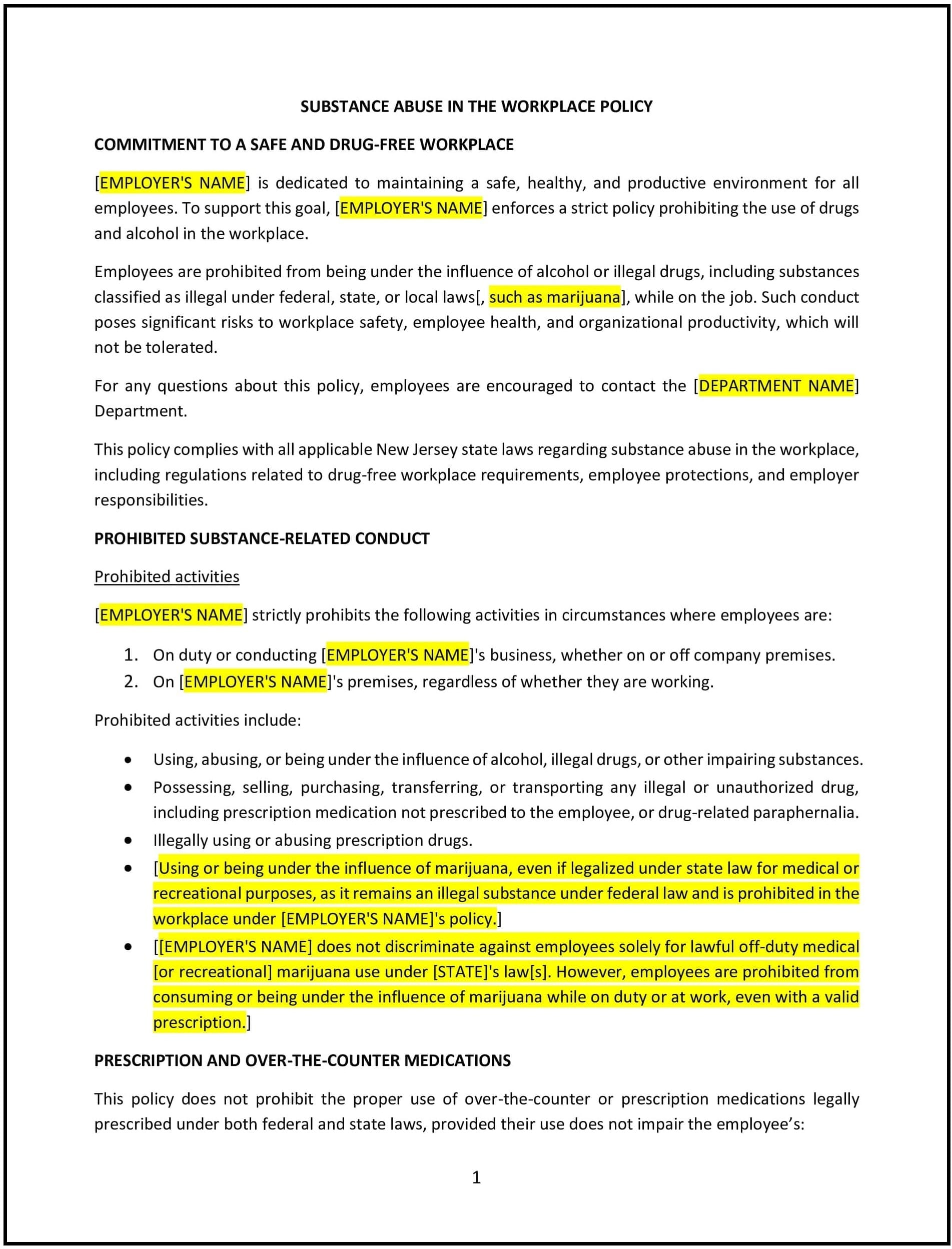Substance abuse in the workplace policy (New Jersey): Free template
Got contracts to review? While you're here for policies, let Cobrief make contract review effortless—start your free review now.

Customize this template for free
Substance abuse in the workplace policy (New Jersey)
A substance abuse in the workplace policy helps New Jersey businesses establish clear guidelines regarding the use of drugs and alcohol at work. This policy outlines the company’s expectations for employees’ conduct related to substance use, including prohibitions on being under the influence while on the job and the potential consequences of policy violations. It also addresses how employees can seek help for substance abuse issues, ensuring that the workplace remains safe, productive, and respectful.
By adopting this policy, businesses in New Jersey can promote a safe and healthy work environment, reduce workplace accidents, and ensure that employees are supported if they need assistance with substance abuse issues.
How to use this substance abuse in the workplace policy (New Jersey)
- Define prohibited substances: Specify which substances are prohibited in the workplace, including alcohol, illegal drugs, and prescription medications that could impair performance.
- Establish a drug-free workplace: State that employees must not be under the influence of drugs or alcohol while at work, during work hours, or while performing company-related duties.
- Outline testing procedures: If applicable, specify the circumstances under which employees may be subject to drug or alcohol testing (e.g., random testing, post-accident testing, or reasonable suspicion).
- Provide guidelines for handling violations: Outline the disciplinary actions that may be taken if an employee is found to be violating the policy, including warnings, suspension, or termination, depending on the severity of the violation.
- Offer assistance for substance abuse issues: Encourage employees to seek help for substance abuse problems by offering confidential support programs, such as Employee Assistance Programs (EAPs) or rehabilitation services.
- Address legal use of substances: Clarify how the company handles the legal use of alcohol, prescription medication, or medical marijuana, and what accommodations may be offered.
- Foster a safe and supportive environment: Create an environment where employees feel comfortable coming forward with issues related to substance abuse, knowing they will be treated with respect and receive appropriate assistance.
- Review and update: Regularly assess the policy to ensure it aligns with New Jersey laws and best practices in maintaining a healthy and safe work environment.
Benefits of using this substance abuse in the workplace policy (New Jersey)
This policy provides several benefits for New Jersey businesses:
- Promotes a safe and healthy work environment: Reduces the risk of accidents and injuries by addressing substance abuse and maintaining a drug-free workplace.
- Supports employee well-being: Provides employees with access to resources that help address substance abuse issues, leading to better overall health and productivity.
- Increases productivity: Reduces absenteeism, tardiness, and performance issues related to substance abuse.
- Reduces liability: Helps the business comply with New Jersey state laws and reduces the risk of legal consequences arising from substance abuse in the workplace.
- Enhances company reputation: Demonstrates that the company values employee health and safety, fostering a positive reputation among current and potential employees.
Tips for using this substance abuse in the workplace policy (New Jersey)
- Communicate the policy clearly: Ensure that all employees are aware of the policy and its importance in maintaining a safe and productive work environment.
- Offer regular training: Provide training to employees and managers on recognizing signs of substance abuse, handling related issues, and maintaining a supportive approach to affected employees.
- Provide support services: Offer confidential resources, such as counseling and EAP programs, to assist employees dealing with substance abuse problems.
- Monitor compliance: Regularly review workplace practices to ensure that the policy is being followed and take appropriate action when necessary.
- Review the policy regularly: Update the policy to reflect changes in New Jersey regulations, industry standards, or business needs.